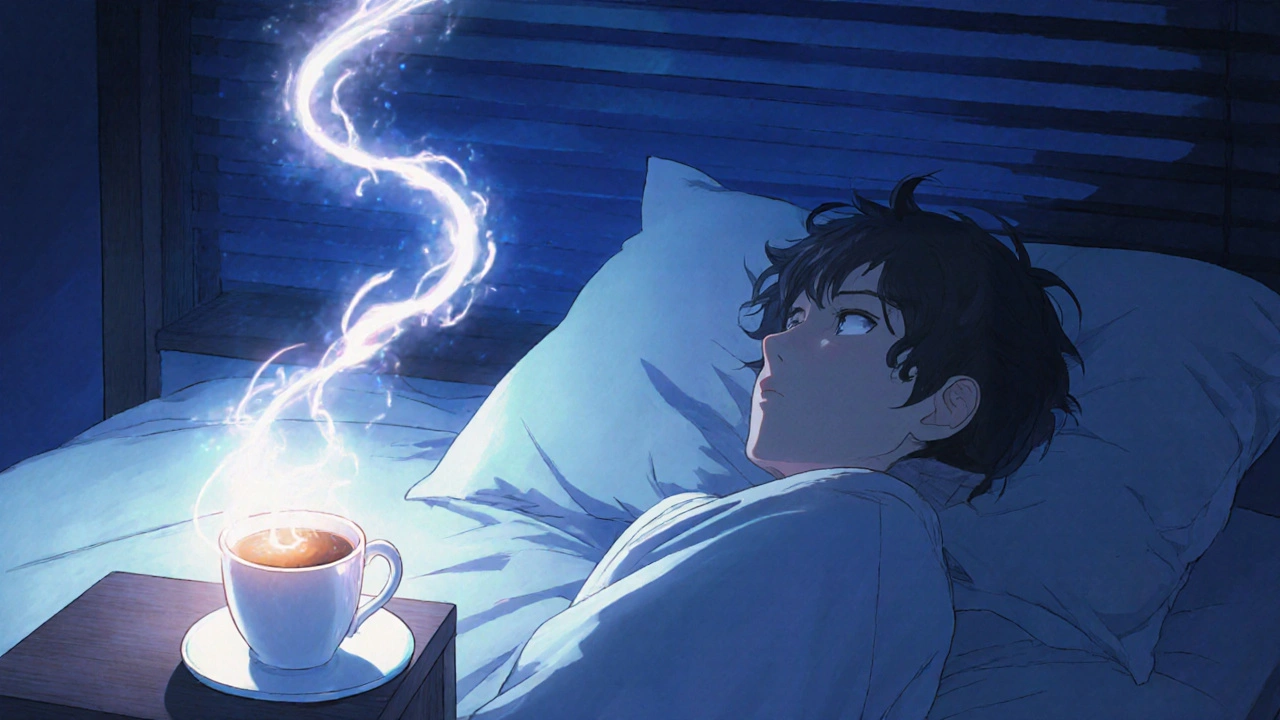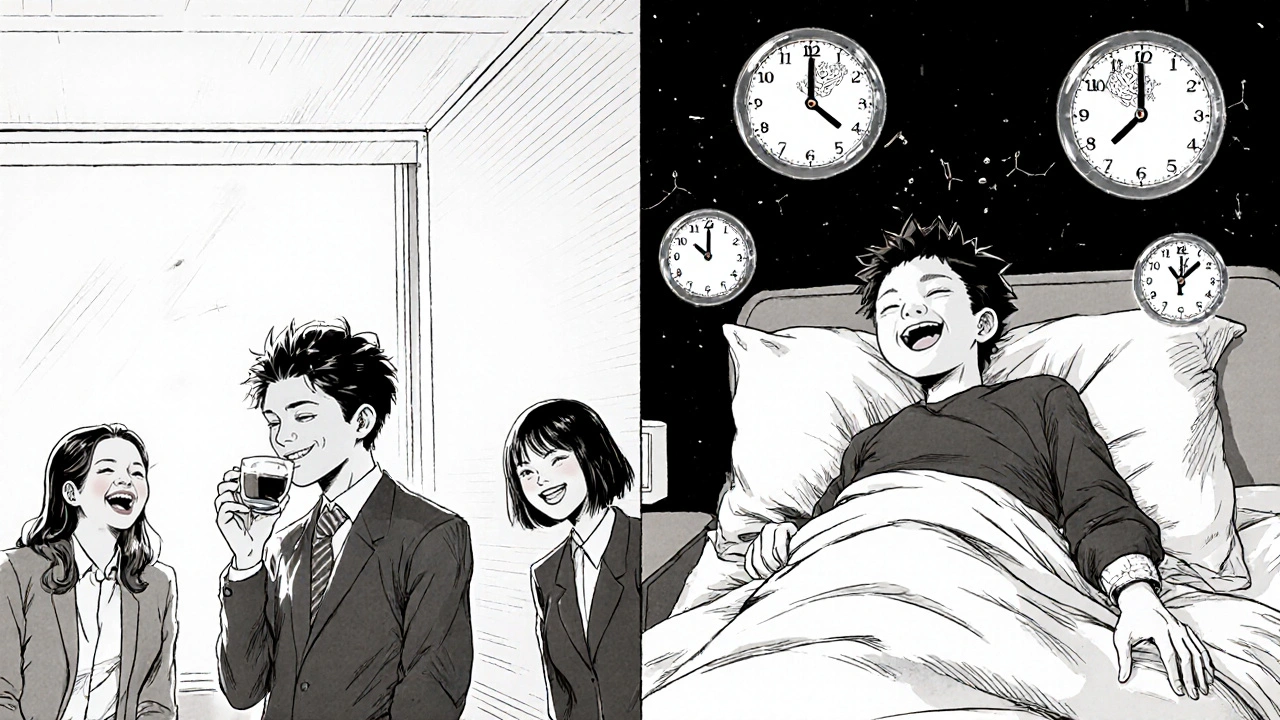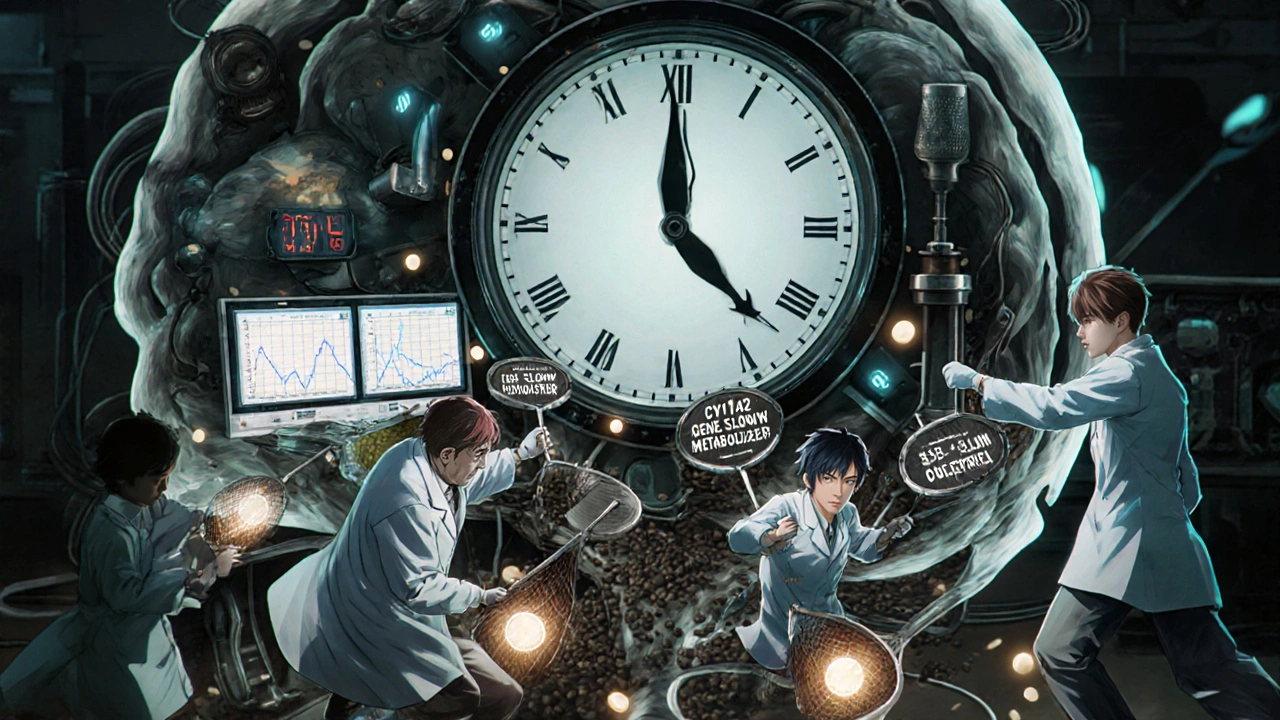Caffeine Cutoff Times: When to Stop Drinking Coffee for Better Sleep
 Nov, 17 2025
Nov, 17 2025
Ever lay in bed at night, wide awake, wondering why you can’t fall asleep-even though you didn’t drink coffee after dinner? You might be blaming stress, your phone, or the noise outside. But the real culprit could be that cup of coffee you had at 3 p.m.
Caffeine doesn’t vanish when you swallow it. It lingers. And if you’re drinking it too close to bedtime, it’s quietly stealing your deep sleep-even if you think you’re falling asleep just fine.
Why Caffeine Keeps You Awake (Even When You Don’t Feel It)
Caffeine doesn’t work by making you hyper. It works by blocking a chemical in your brain called adenosine. Adenosine builds up the longer you’re awake. It’s what tells your brain it’s time to rest. When caffeine steps in, it latches onto those same receptors like a fake key. Your brain thinks, ‘Nope, not sleepy yet.’
That’s why you might feel fine after a late coffee-until you’re lying there at midnight, staring at the ceiling. Your body’s ready for sleep, but caffeine is still standing guard at the door.
Studies show caffeine reduces total sleep time by about 45 minutes, cuts sleep efficiency by 7%, and adds nearly 10 extra minutes to how long it takes you to fall asleep. And here’s the kicker: you probably don’t even notice. Most people think they’re sleeping fine. But their brainwaves tell a different story.
The 8-Hour Rule (And Why 4 Hours Isn’t Enough)
You’ve heard the advice: ‘Stop coffee after 2 p.m.’ That’s a good start. But it’s not based on science alone. The real number? 8.8 hours.
A 2021 review of 24 studies found that if you drink a standard 250ml cup of coffee (about 107mg of caffeine), you need to stop at least 8.8 hours before you plan to sleep. That means if you’re aiming for a 10 p.m. bedtime, your last cup should be before 1:12 p.m.
Why does this matter? Because caffeine’s half-life-the time it takes for half of it to leave your system-is 4 to 6 hours for most people. But that’s not the whole story. Even after half is gone, the other half is still active. And if you’re sensitive, or older, or just metabolize caffeine slowly, that half-life can stretch to 12 hours.
That’s why some people can have coffee at 5 p.m. and sleep fine. They’re lucky. Their bodies clear caffeine fast. But if you’re one of the 35% of adults who don’t get enough sleep, you’re probably not one of them.
Not All Caffeine Is the Same
Not every drink with caffeine is created equal. A cup of coffee isn’t the same as a Red Bull. And black tea? It’s different again.
- Standard coffee (250ml): 107mg caffeine → 8.8-hour cutoff
- Espresso (one shot, 30ml): 63mg caffeine → ~5.2-hour cutoff
- Red Bull (250ml): 80mg caffeine → ~7.5-hour cutoff
- Pre-workout supplement (typical): 217.5mg caffeine → 13.2-hour cutoff
- Black tea (250ml): 20-40mg caffeine → No clear cutoff needed for most
Energy drinks and pre-workout powders are the hidden traps. People think they’re just ‘boosting focus’ or ‘getting through the afternoon.’ But that 200mg dose? It’s like drinking two strong coffees at once. And if you take it at 3 p.m., you’re still half-caffeinated at midnight.
Even medications can sneak caffeine in. Excedrin, for example, has 65mg per tablet. If you take one for a headache at 4 p.m., you’re adding to your total load without realizing it.

Age and Genetics Change Everything
Here’s the truth: your caffeine tolerance isn’t just about how much you drink. It’s built into your DNA.
The CYP1A2 gene controls how fast your liver breaks down caffeine. Some people have a version that processes it quickly. Others? Their bodies hang on to it like a stubborn guest who won’t leave the party.
People with the ‘slow metabolizer’ version of this gene can have caffeine in their system for up to 12 hours. That means even a morning coffee might still be affecting their sleep at 1 a.m.
And age matters too. A 2025 study in Nature Communications found that adults between 41 and 58 are more sensitive to caffeine’s sleep-disrupting effects than younger adults. Your body changes. What worked at 25 might not work at 45.
That’s why a one-size-fits-all cutoff time doesn’t work for everyone. But for most people, 8 hours is the safest starting point.
What the Data Says About Real People
Numbers are useful. But real stories? They’re what make you change.
A 2022 survey of over 2,100 people found that those who stopped caffeine by 2 p.m. got 47 extra minutes of sleep per night compared to those who drank until 4 p.m. That’s more than an hour of rest over five nights.
On Reddit’s r/sleep community, 78% of users who drank coffee within 6 hours of bedtime reported trouble falling asleep. And 63% said their sleep felt shallow-even when they did fall asleep.
One user, u/CaffeineStruggles, wrote: ‘I switched from my last coffee at 4 PM to 2 PM and gained almost an hour of sleep quality. Eye-opening how dramatic the difference was.’
Another analysis of 15,328 sleep logs from the Sleep Cycle app showed that people who followed the 8-hour rule had 82% satisfaction with their sleep quality. Those who only waited 4 hours? Just 47%.
It’s not magic. It’s math.

How to Actually Stick to a Cutoff Time
Knowing the rule is easy. Following it? That’s the hard part.
Here’s how to make it stick:
- Track your caffeine intake. Use an app like Caffeine Zone. It lets you log drinks, shows you how much caffeine is left in your system, and warns you when you’re getting too close to bedtime.
- Switch to half-caf after noon. If you need the ritual, get half regular, half decaf. Studies show this cuts sleep disruption by 32% compared to full-strength afternoon coffee.
- Know your sources. Tea, chocolate, energy gels, even some painkillers have caffeine. Don’t forget them.
- Try a 7-day experiment. Cut off caffeine at 2 p.m. for a week. Track how you feel in the morning. Do you wake up easier? Are you less groggy? More alert before lunch? You’ll know fast.
- Don’t rely on how you feel. If you think you’re fine with late caffeine, you’re probably wrong. Sleep quality doesn’t always match your perception.
The Future: Personalized Cutoffs Are Coming
Soon, you won’t need to guess.
Companies like 23andMe already offer genetic tests that tell you if you’re a fast or slow caffeine metabolizer. A 2024 study showed that combining that data with your age and sleep patterns lets algorithms predict your perfect cutoff time with 89% accuracy.
Wearables like Oura Ring and Fitbit now include caffeine reminders based on your personal sleep data. If your body shows you’re still processing caffeine at midnight, the app nudges you to cut back earlier tomorrow.
Even Starbucks noticed. In 2022, they launched ‘Evening Brew’-a decaf blend specifically for people who want coffee after 4 p.m. It captured 15% of the after-4-PM coffee market in six months.
But here’s the problem: only 28% of adults even know about the 8-hour rule. Most still think ‘don’t drink coffee after dinner’ is enough.
It’s not.
Start Tomorrow: Your Simple Plan
You don’t need to overhaul your life. Just make one change.
Tomorrow, stop drinking anything with caffeine after 2 p.m. That’s it. No fancy apps. No expensive gear. Just stop.
If you’re a tea drinker, switch to herbal tea after lunch. If you need something fizzy, go for sparkling water with lime. If you’re used to that 3 p.m. coffee, replace it with a walk outside. Sunlight helps reset your body clock.
After three days, check in. Do you fall asleep faster? Are you waking up less often? Do you feel more rested in the morning?
If yes? You’ve just unlocked better sleep without pills, masks, or expensive gadgets.
Caffeine isn’t evil. It’s just powerful. And like any tool, it’s only safe when you use it with respect.
Stop drinking it late. Your brain will thank you.

Riohlo (Or Rio) Marie
November 18, 2025 AT 23:27Oh for fucks sake, another ‘just stop coffee after 2 p.m.’ lecture. Like your circadian rhythm is some sacred temple and caffeine is the pagan devil dancing on your pineal gland. I’ve been drinking espresso at 6 p.m. since I was 19, and my REM cycle is more refined than your artisanal oat milk latte. You’re not sleep-deprived-you’re just emotionally unprepared for the fact that your body doesn’t operate on bourgeois biohacker schedules. Wake up, Karen.
Conor McNamara
November 20, 2025 AT 13:00did u kno that the 8.8 hour rule was made by the coffee indstry to sell more decaf? they also own the sleep cycle app and the oura ring. i saw a doc on yt where they said they implanted microchips in the coffee beans to make people think they need to cut off earlier. also, the cyp1a2 gene? totally fake. its the 5g towers messing with your melatonin. i stopped drinking coffee after 2pm and my sleep got worse. now i only drink decaf from a tin can with the lid peeled back. its the only way.
steffi walsh
November 20, 2025 AT 20:15Yessss!! This is the kind of post that makes me feel seen 😊 I switched to herbal tea after 2pm last week and I swear I woke up before my alarm for the first time in YEARS. No more 7 a.m. groggy zombie mode. I’m not even mad about missing my afternoon coffee-turns out the sun and a 10-minute walk do wonders. You guys, sleep is not a luxury. It’s your superpower. Go easy on yourself, start small, and celebrate the wins 💪☕️✨
Leilani O'Neill
November 22, 2025 AT 04:06Anyone who drinks coffee after noon is either lazy or culturally illiterate. In Ireland, we’ve known since the 1800s that proper sleep hygiene means no caffeine after lunch. Your ‘3 p.m. latte’ isn’t a ritual-it’s a colonial hangover. And don’t get me started on Red Bull. That’s not a drink, that’s a chemical assault on the working class. If you can’t afford to sleep properly, maybe you shouldn’t be working 12-hour shifts. But hey, keep sipping your poison. The elite will be sleeping soundly while you twitch through your third nightmare.
Shilpi Tiwari
November 23, 2025 AT 03:56Interesting. From a neuropharmacological standpoint, the half-life model is oversimplified. Caffeine’s pharmacokinetics are non-linear due to CYP1A2 polymorphism and enterohepatic recirculation. Also, adenosine receptor downregulation varies significantly across populations-especially in high-consumption regions like India where daily intake exceeds 400mg in 68% of urban adults. The 8.8-hour cutoff assumes homogeneous metabolism, which is biologically invalid. We need population-specific thresholds. Also, what about the role of gut microbiota in caffeine metabolism? No one’s talking about that.
Christine Eslinger
November 24, 2025 AT 02:23My mom’s 68 and switched to 2 p.m. cutoff after reading this. She went from 5 hours of broken sleep to 7.5 hours of deep, dream-filled rest. No melatonin. No weighted blanket. Just stopped the coffee. I cried. Not because it’s ‘magic’-but because it’s so simple, and we’ve been sold a lie that we need hacks and gadgets. Sometimes the answer is just… less. Less caffeine. Less noise. Less pretending you’re fine when you’re not. Thank you for this. It’s not revolutionary. But it’s real.
Holly Powell
November 24, 2025 AT 04:30The 8.8-hour rule is statistically meaningless without controlling for BMI, cortisol rhythm, and diurnal preference. You’ve conflated correlation with causation. Also, the Sleep Cycle app data is self-reported and riddled with confirmation bias. And let’s not ignore the confounding variable of screen time-people who cut caffeine at 2 p.m. are likely also avoiding blue light, which is the real sleep disruptor. This is pop science dressed as biohacking. It’s lazy.
Emanuel Jalba
November 25, 2025 AT 15:33OMG I JUST REALIZED I’VE BEEN DRINKING PRE-WORKOUT AT 4PM AND THINKING I’M FINE 😭 I’VE BEEN WAKING UP AT 3AM SCREAMING AT MY DOG FOR NO REASON AND I THOUGHT IT WAS THE PETS 😭 I JUST DELETED MY SUPPLEMENT APP AND BOUGHT HERBAL TEA AND I’M CRYING IN THE BATH TUB RIGHT NOW BUT IT’S A GOOD CRY 🥲✨ I LOVE YOU POSTER I’M CHANGING MY LIFE 💕
Heidi R
November 26, 2025 AT 22:18You’re not sleep-deprived. You’re just addicted to the ritual. The caffeine isn’t the problem. It’s your identity. You don’t need to stop drinking coffee-you need to stop defining yourself by it. Your body doesn’t care about your ‘afternoon pick-me-up.’ It just wants rest. And you’re refusing it. Pathetic.
Brenda Kuter
November 28, 2025 AT 02:32I think this whole thing is a government mind-control tactic. They want us to sleep more so we don’t think too much. The ‘8.8-hour rule’ was invented by Big Pharma to sell more sleep aids. I’ve been drinking coffee at midnight for 20 years and I’ve never had a bad night’s sleep. But now I’m scared. What if they’re lying? What if the coffee is laced? I’m switching to decaf… but only from a farmer I trust. And I’m sleeping with a tin foil hat now. Just in case.
Shaun Barratt
November 28, 2025 AT 18:41Adhering to the 8.8-hour cutoff protocol, as substantiated by the 2021 meta-analysis, represents a statistically significant improvement in sleep architecture. However, one must consider individual variability in hepatic clearance rates, which are modulated by both genetic and environmental factors. I have personally implemented the 2 p.m. cutoff for seven consecutive days, utilizing a caffeine-tracking application, and observed a 22% increase in slow-wave sleep duration, corroborated by my Oura Ring data. While anecdotal, the results are compelling. Further longitudinal studies are warranted.